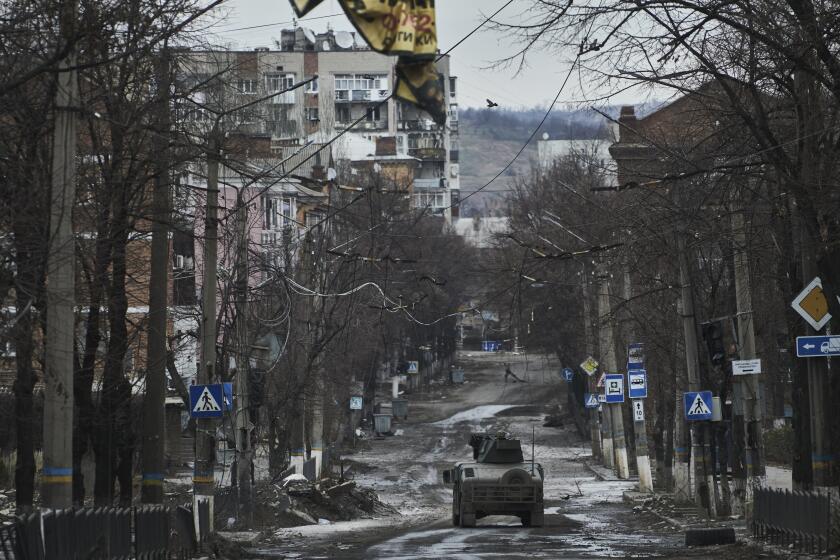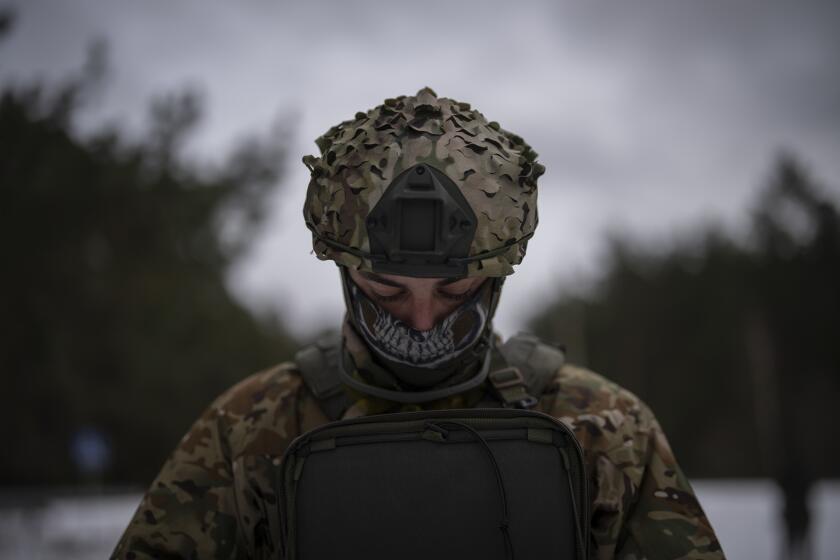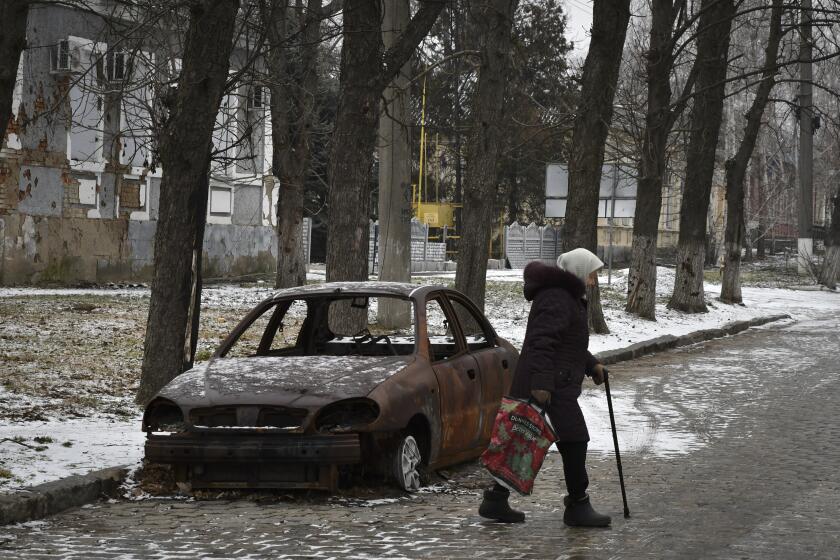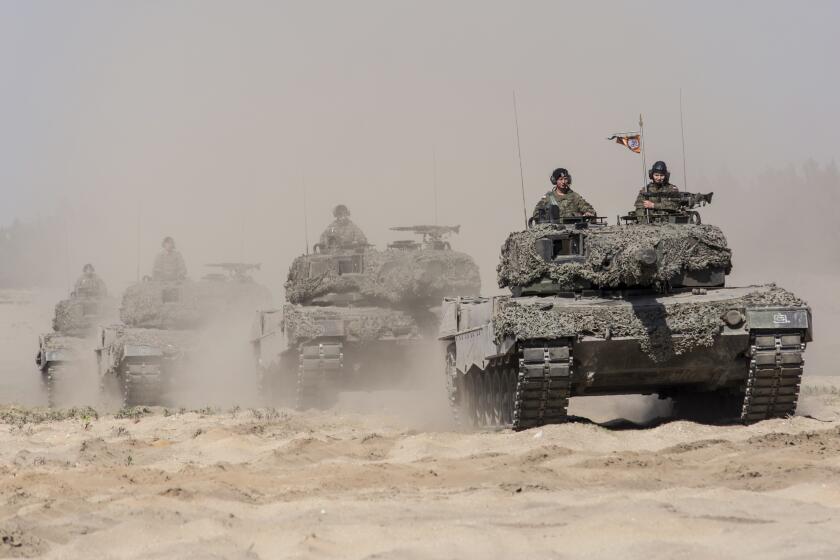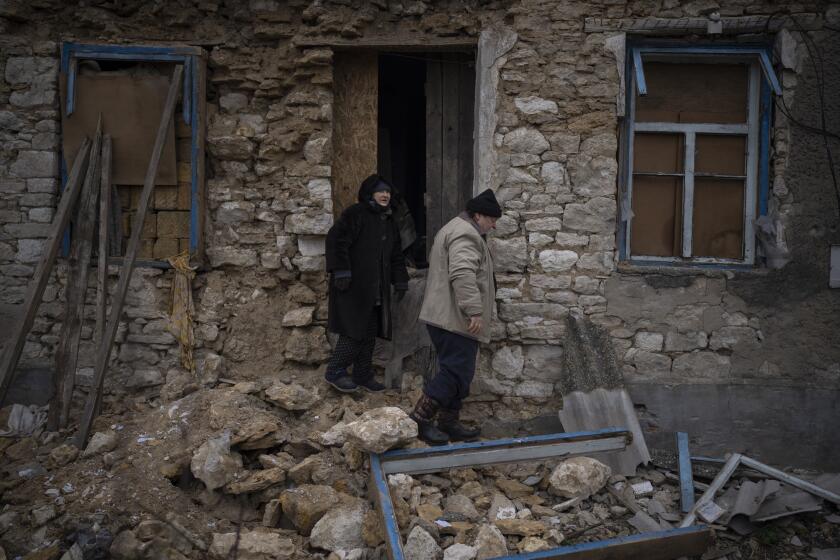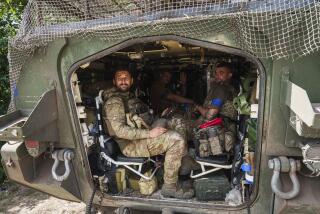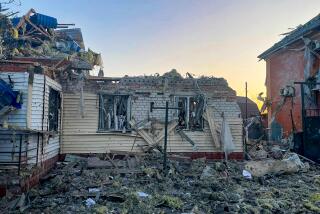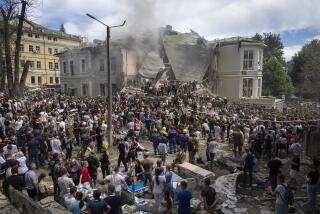Russian forces hit more civilian targets as Ukraine foresees a renewed assault
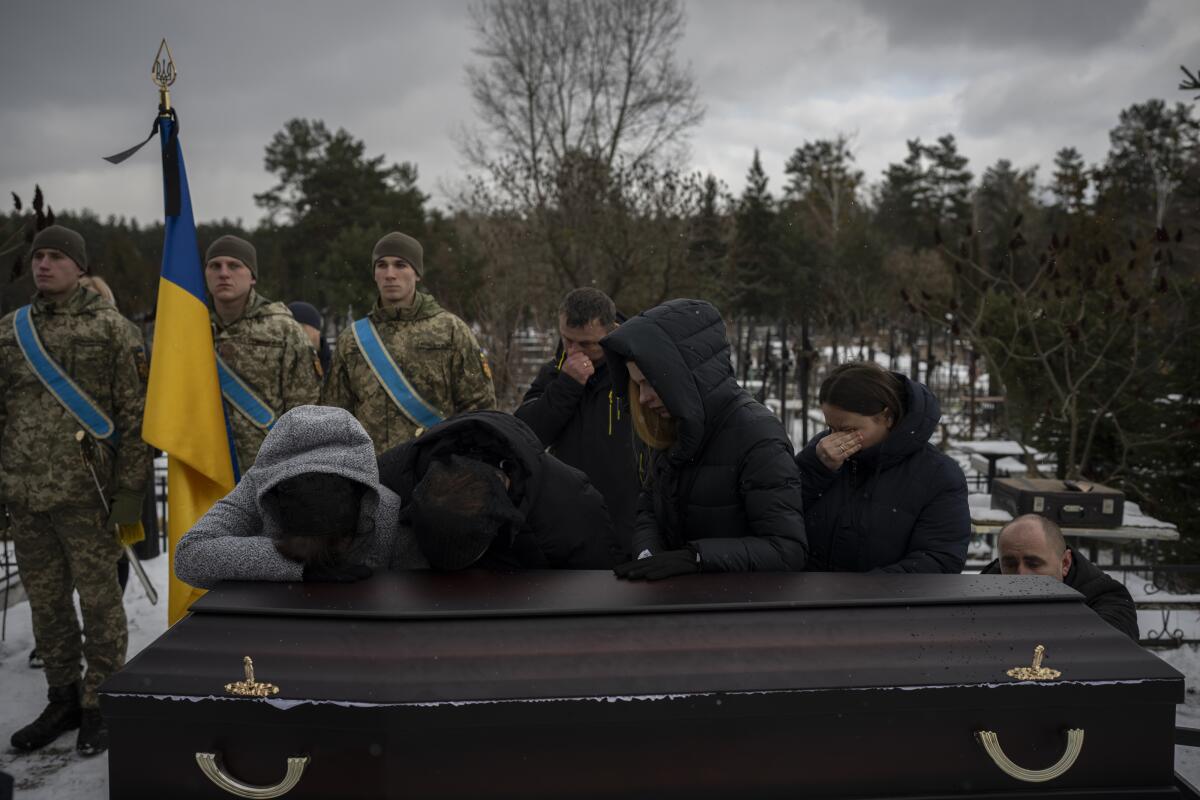
- Share via
KYIV, Ukraine — Russian shelling damaged a hospital and apartment buildings in Ukraine, local officials said Tuesday, while military analysts expressed skepticism about the potential impact of what Kyiv says is a brewing offensive by Moscow’s forces around the anniversary of its invasion.
The shelling caused multiple fires in the northeastern town of Vovchansk, including at its two-story municipal hospital, the State Emergency Service in the northeastern Kharkiv region said in an online statement.
Emergency crews evacuated eight civilians from the site before putting out the blaze, which caused no casualties, authorities said.
Vovchansk is in the Kharkiv region, which was occupied by Russia after its full-scale invasion began Feb. 24, 2022, but was subsequently retaken by Ukraine during a counteroffensive last year.
The anticipated Russian push may seek to recapture territory Moscow lost in that counteroffensive. Battlefield setbacks have embarrassed the Kremlin, and Russian President Vladimir Putin is keen to cement public support for the war.
The longest battle of the war in Ukraine has turned Bakhmut into a ghost city fought over by Ukrainian troops and by Russian forces eager for a win.
Ukrainian officials say they expect the new drive to come in eastern and southern Ukraine, as the Kremlin strives to secure areas it has illegally annexed and where it claims its rule is welcomed.
Some Western military analysts are skeptical, however, of Russia’s ability to mount a large new offensive in coming weeks, particularly in time for the Feb. 24 anniversary, that might alter the course of the war. Ukraine and Russia are both still training their new troops and amassing weapons.
The British Ministry of Defense said in an assessment Tuesday that Russia is “requiring undermanned, inexperienced units to achieve unrealistic objectives due to political and professional pressure.
“Russian leaders will likely continue to demand sweeping advances. It remains unlikely that Russia can build up the forces needed to substantially affect the outcome of the war within the coming weeks.”
On the Belarusian border, Ukrainian drones monitor a long expanse of marsh and woodland for a possible Russian offensive from the north.
Michael Kofman, an American military analyst and director of Russia Studies at the CAN research organization in Arlington, Va., tweeted Monday it was unclear how big an offensive Russia is able to mount.
He added: “But I suspect it may prove underwhelming, focused largely on the Donbas” — the eastern industrial region of Ukraine bordering Russia.
Michael Clarke, visiting professor of war studies at King’s College London, said he would be “amazed, I mean, truly amazed, if [the Russians] are in any shape to launch a strategic offensive on the 24th.”
He acknowledged that Moscow has been scaling up its troop deployment in Ukraine and said that Russia could also launch local offensives or major air attacks. But he recalled that Russian commanders were still smarting from their failed attempt early in the war to take Kyiv and topple the Ukrainian government.
The possibility of providing Kyiv with fighter jets to help beat back Russia’s invasion risks the unity of Ukraine’s Western allies.
He said that “military planners in Russia will be aware that when they start this new offensive, they’ve got to get it right. After the fiasco of the first [offensive], it would be better to leave it and go late than go early and make a mess of it again.”
Russian forces are “regrouping” as they attempt to break Ukrainian lines in five areas in the country’s east and northeast, the Ukrainian military reported Tuesday.
The General Staff of the Armed Forces of Ukraine said Moscow was focusing its efforts near the towns of Lyman, Bakhmut, Avdiivka and Novopavlivka in the eastern Donetsk region, as well as Kupiansk in Kharkiv province.
In the Donetsk region, Russian forces also kept up their shelling of Vuhledar, a mining town that has been one of Moscow’s key targets, the Ukrainian presidential office said. Five apartment buildings were destroyed in the town, the office said, which had a prewar population of 14,000.
The wariness over military involvement that made Germany hesitate to send tanks to Ukraine is rooted in the country’s memories of World War I and II.
Donetsk province has seen a marked influx of Russian troops in the last few days, according to regional Gov. Pavlo Kyrylenko.
“The transfer of Russian army units goes on day and night. Shelling intensifies, pressure from the Russians intensifies each day,” Kyrylenko said on Ukrainian television.
Russia is also preparing for a major offensive in the eastern Luhansk region, directly north of Donetsk, local Gov. Serhii Haidai said in televised remarks.
The number of Russian attacks in the province increased “dramatically” Monday and overnight, he said.
Start your day right
Sign up for Essential California for the L.A. Times biggest news, features and recommendations in your inbox six days a week.
You may occasionally receive promotional content from the Los Angeles Times.
“The occupiers are looking for weak points and have brought a lot of equipment and thousands of troops to the front line,” Haidai said.
About 60,000 households in Marhanets were left without water after Russian shelling near the Zaporizhzhia nuclear power plant cut the power supply to a local pumping station, authorities reported.
Mykola Lukashuk, who heads the Dnipropetrovsk Regional Council, accused Russian forces of firing on towns and villages neighboring the plant, Europe’s largest, with heavy artillery and multiple-rocket launchers overnight.
Meanwhile, the Ukrainian parliament Tuesday appointed national police chief Ihor Klymenko as the country’s new interior minister. Klymenko had served as acting interior minister since the Jan. 18 death of his predecessor, Denys Monastyrskyi, in a helicopter crash on the outskirts of Kyiv.
Liberation has not diminished the hardship for residents of the Ukrainian village of Kalynivske, both those returning home and those who never left.
The Ministry of Internal Affairs controls the police and border forces, National Guard and emergency response service.
Ukraine’s parliament, the Verkhovna Rada, also appointed Vasyl Malyuk to lead Ukraine’s main security agency.
More to Read
Sign up for Essential California
The most important California stories and recommendations in your inbox every morning.
You may occasionally receive promotional content from the Los Angeles Times.
